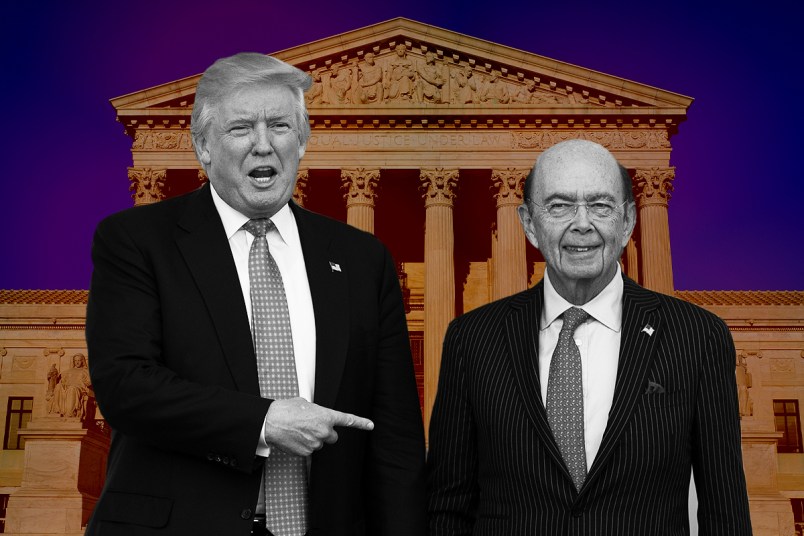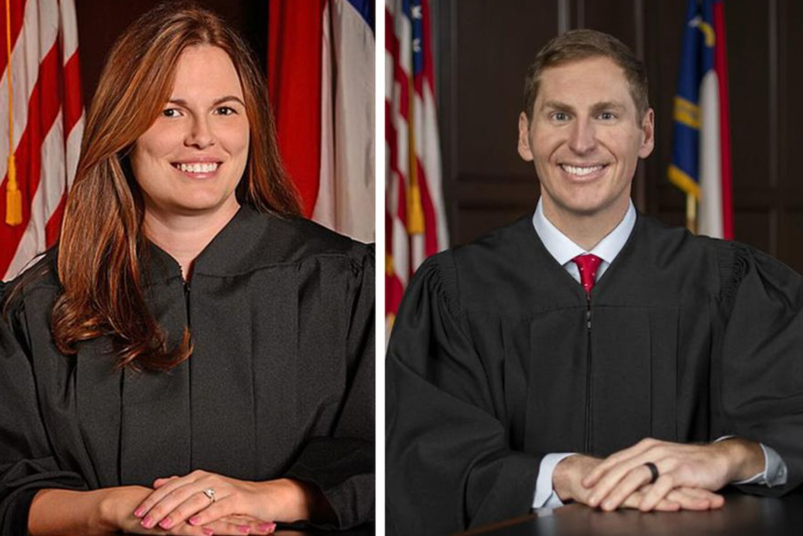The conservative Supreme Court wants to find a way to punt on a case challenging President Trump’s anti-immigrant census apportionment policy.
But the Justice Department, in its vague answers to the justices’ questions at Monday’s oral arguments, didn’t make that task any easier for the court’s GOP-appointed majority.
There does not appear to be a combination of five justices who agree with the merits of the Trump administration’s arguments defending the legality and constitutionality of the policy, which seeks to exclude undocumented immigrants from the count that determines the number of House seats each state gets.
Even Justice Amy Coney Barrett — an archconservative and Trump’s latest addition to the court — sounded skeptical of the substance of those underlying claims.
But rather than spend much time on the merits of the dispute, the conservatives of the court seemed most intent of fleshing out the timing and feasibility issues surrounding the policy, which three lower courts have already found to be illegal.
Those questions appeared driven by an eagerness among the conservative justices to find a procedural off-ramp that would let them delay deciding the dispute for now. Such a delay could even allow the court to avoid deciding it altogether, if the Biden administration takes over before the policy can be implemented — a scenario that the recent delays in the census’ final stages makes very plausible.
But finding that off-ramp was frustrated by the the administration’s continued squirreliness about just how much manipulation it can logistically do to the census in order to boost whiter, more reliably Republican states.
“You’re 30 days out,” Justice Elena Kagan told acting U.S. Solicitor General Jeffrey Wall, in reference to the rough timeline the administration is facing to implement the policy. “Why the uncertainty on this?”
She joined several conservative justices in grilling Wall on just how many undocumented immigrants Trump will be able to remove from the apportionment totals. If President was able to exclude several million from the count, it could costs multiple states House seats. But so far, the administration has only publicly guaranteed that it will be feasible to exclude a much smaller subset of that number.
“Should we assume that we’re not going to be talking about all illegal aliens in the country, but some subset — some uncertain subset — like the ones in ICE detention,” Chief Justice John Roberts asked Wall on Monday.
After Wall told Roberts that “we don’t know what’s feasible,” several other GOP-appointed justices followed up with different versions of the same question.
“Can you not provide us with any more information than what you provided in your answer to the Chief Justice [which] was that, basically, they’re working on it,” Justice Samual Alito said.
The justices are confronting two competing realities within the choice to punt on the case. It’s possible that it won’t be feasible for the Census Bureau to implement the policy in a way that would have any real effect on how political power or funding is doled out across the country. But if the court waits to find out whether a small subset of the undocumented immigrant count is all that the Census Bureau can deliver, it might be even messier to “unscramble the egg” then, as the chief justice put it, than the current situation the court finds itself in now.
“I find the posture of this case quite frustrating,” Alito said. “It could be that we
are dealing with a possibility that is quite important. It could be that this is much ado about very little. It depends on what the Census Bureau and the Commerce Department are able to do.”
The liberal justices, along with Roberts, asked questions geared at laying out the downsides for waiting until after the apportionment numbers — including the undocumented immigrants — are delivered to the President.
The lawyers arguing for the parties challenging the policy — with New York Solicitor General Barbara Underwood representing the state and local governments that are suing the administration, and the ACLU’s Dale Ho representing the immigrants rights organization involved in the case — also faced questions from the justices on just how likely it was that the administration could implement the policy to the extent Trump’s July announcement of it envisioned.
Both lawyers admitted that they were not experts in the technical process the Census Bureau is currently going through to match existing government records reflecting legal status to the individuals enumerated by the census.
Some of the justices suggested that the “speculation” around whether the policy will be fully implemented meant that the challengers had not yet crossed the procedural threshold — known as standing — that allows for a court to intervene.
“It’s speculation that they won’t be able to do it,” Underwood said.
Of the four lower courts that have weighed in on the policy, only one — a D.C.-based panel of judges — stopped short of calling it illegal. One of the three courts that struck it down also said the policy was unconstitutional.
The Constitution mandates a decennial census that enumerates the “whole number of persons in each state” for purposes of congressional apportionment. The statutes passed by Congress governing the census apportionment process reaffirm that understanding.
It also appears that some of the justices on the court think a new version of the policy, that only targeted a subset of immigrants — like those who stand to be deported in in the near future — would be a different legal question. Ho acknowledged that lower court rulings against the July policy don’t stop Trump from issuing a new memo with narrower targets, but that too could be subject to litigation.
“There’s nothing that stops the court from ruling on the facial validity of this policy,” Ho said.











Ahem.
Answer was no.
Maybe, if you don’t count embarrassment.
Trump’s acting Solicitor General essentially begged the Court not to let Trump’s opponents “run out the clock.” We’ll see what Roberts et al. make of this.
I, for one, am appalled at this Rodent American slur!
If the Trumpp admin planned the D-Day invasion, the plan would have fit on a 3x5 card, written with a Sharpie.
Just like the cheaper/better healthcare plan and the plan to fight covid.
And I am appalled by your rodent nationalism.